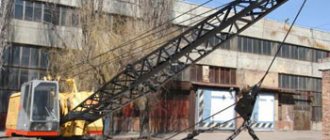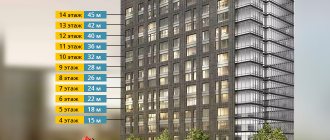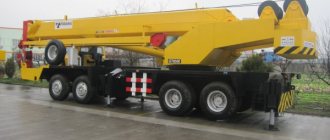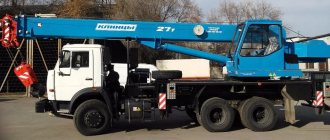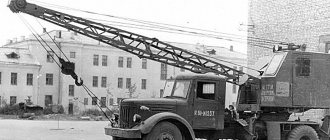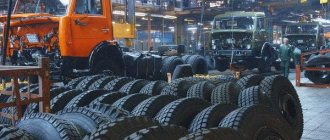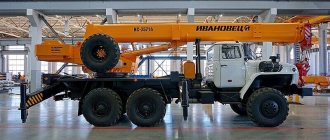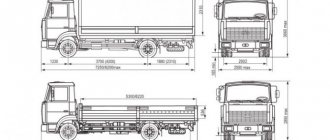See also: Technical characteristics of the articulated aerial platform
The telescopic design is the most modern to date. The system of box beams nested inside each other provides compactness with a significant boom length when unfolded. The hydraulic drive is also the most compact solution with minimal weight for a given performance.
Many companies produce aerial platforms based on their own research, so the designs of different companies can vary significantly. We combined them according to their main characteristics and classified them according to their characteristics.
Telescopic lifts and towers differ in four main characteristics and three additional ones.
The main ones matter when choosing a machine based on the general tasks for it.
Additional ones are needed for more accurate selection of the car.
Main characteristics
Maximum working height
The maximum working height (MAH) is calculated as the distance from the parking lot to the cradle floor at the highest point. Sometimes the technical specifications (TC) indicate a service height that is greater than the maximum height by approximately the average height of a person. The height of the AGP should be selected with a boom length margin of 2-3 meters.
10-18 meters
For maintenance work on the city electrical network and poles. The height of 18 meters correlates with the height of a 5-story building.
A small MDV does not always mean that the base chassis is a light truck. AGP with a small MPV is installed on a high-pass chassis, for example, VIPO-18-01 GAZ-33086. There are also compact models that allow you to work at a height of up to 26 meters with a reach of up to 14 meters based on a chassis with the dimensions of a passenger car (Dasan DS280S Hyundai Mighty).
19-28 meters
Maintenance of buildings with 9 floors, overpasses, for installation work
Medium-height lifts can be installed on a high-pass chassis with a 6x6 formula (VIPO-24-01 24 KAMAZ-43118), on a regular city truck (VIPO-24-01 GAZ 33086) or on the basis of an all-metal van (Socage 12VT Ford Transit, Klubb K21B Peugeot Expert)
29-45 meters
Maintenance of high-rise buildings, structures, structures, installation and rescue work.
There are also cargo aerial platforms or telescopic winch lifts such as Woosung WS-L45 on the Hyundai HD35 chassis
More than 45 meters
Lifts based on heavy city trucks with a wheel arrangement of 4x6, 6x6, 4x8, 4x10 and more.
The most popular bases for AGP over 45 meters:
● Hyundai
●Volvo
● Daewoo
●Mercedes
●MAN
The supporting contour of such lifts can reach 100 m2 or dimensions of 10x10 meters.
Car engine
Despite the fact that the first production model of the car in question was released back in 1966, the technical characteristics of the engine in many areas satisfy the needs of the Russian army even today:
| Parameter name | Characteristic | Units |
| engine's type | Carburetor, four-stroke | |
| Number of working cylinders | 8 | PC. |
| Cooling type | Liquid | |
| Valves | At the top of the engine | |
| Diameter of working cylinders | 100 | mm |
| Working volume of the combustion chamber | 6 | l |
| Piston stroke length | 95 | mm |
| Compression | 6,5 | |
| Maximum engine power | 150 | l. With. |
| Torque at 2,000 rpm | 410 | N×m |
Thanks to its great power and high torque, the ZIL-131 could reach speeds of up to 85 km/h on the highway. Considering the year of manufacture, this parameter can be called quite impressive.
Not every passenger car of those years could move so fast, not to mention trucks of such a large mass.
The fuel consumption of the ZIL-131, shown in the photo on the right, with a mixed driving cycle is 49.5 liters per 100 km at an average speed of 60 km/h.
According to the technical specifications, the engine is designed to work with AI-76 gasoline or a similar one, but with a higher octane number.
Maximum horizontal boom reach
The maximum horizontal reach (MHR) of the boom is the maximum distance in plan from the turret axis to the edge of the cradle. This TX is linked to three other parameters of the lift:
● Boom length - MGV physically cannot be greater than the boom length
● Chassis weight - the higher it is, the greater the reach it can balance
● Dimensions of the support contour - the greater the distance from the center of gravity of the machine to the support points (jacks, paws, outriggers), the larger the lever can balance the chassis with the turret.
Therefore, models with a shorter boom length may have a greater maximum reach than models with a longer boom.
An example of the disproportionality of MGV and MDV in different models
| Model | MDV, m | MGV, m |
| Klubb KT48 Iveco Daily | 16 | 10 |
| AGP-22T GAZ-33086 DK | 22 | 10 |
| VS-18T-08 GAZ-33088 | 18 | 12 |
| Jinwoo 280M Hyundai HD78 | 27 | 12 |
MGV affects the carrying capacity of the cradle. The documentation for each model contains diagrams indicating the exact load capacity of the cradle on each section of the boom at different sections of the reach.
On average, the lift retains 100% of the cradle's load capacity (HL) at 70% of the reach.
The GL at maximum reach cannot be less than 80 kg.
Many modern AGPs have a critical departure alarm.
additional characteristics
Cabin design
The cabin can be single-row or double-row. A useful function of a two-row cabin is the transportation of up to 3 additional workers or a set of tools, equipment, and building materials.
The chassis model can be made in both versions:
● VIPO-20-01-01 GAZ-3309
● VIPO-20-01-07 GAZ-3309 DK
The double-row cabin is most suitable for duty and emergency crews.
Cradle rotation angle
The ability to adjust the angle affects the maneuverability of the cradle and the comfort of workers. The greater the degree of rotation, the more accurate the delivery of the cradle to the workplace and the faster the work is done at the point.
Most common angles:
● 0О — PSS-131.18E MAZ-533702
● 90О — VIPO-24-01 KAMAZ-43253
● 180О — Socage T-322 22 KAMAZ-43253
● 360О — Hansin HS450A Daewoo Novus
Adjustment at height is carried out from the remote control in the cradle or the remote control.
Cradle material
Three versions of the cradle:
● Steel - VIPO-28-01 KAMAZ-43253
● Aluminum – Palfinger P190T KAMAZ-43253
● Plastic, polymer - Palfinger PD145V Mercedes-Benz Sprinter
The lighter the cradle, the higher the specific load capacity of the entire mechanism, faster and more accurate maneuvers.
Cradle insulation
For electrical installation, repair and emergency work, the boom must be protected from current. To do this, the cradle and the platform are separated by a dielectric. The presence of the letter “E” in the model name means that the cradle is insulated. Insulators are always clearly visible PSS-131.22E GAZ-C41.
Plastic cradles themselves serve as insulators and do not require additional protection.
Body lift crane zil 130
Control crane for dump trucks ZIL-MMZ-4502 and ZIL-MMZ-45021
The control valve (Fig. 12) contains a plunger-spool 2, safety and check valves.
The safety valve consists of a spring o, a ball U, a pusher 7 and a plug 6 with a sealing aluminum washer 4. Adjustment is made with washers 8.
The check valve includes a ball 13, a lower cross 12, an upper cross 11 and a seat 14 with an o-ring 15. The check valve parts are inserted into the body of the control valve when it is installed on the pump.
A rubber o-ring 3 is used to seal the plunger-spool.
Next to ring 3 in the valve body there is an annular groove connected through the drainage channel “E” with the drain pipeline.
The mounting and technological holes in the control valve body are closed with two plugs 10 with conical threads.
Rice. 12. Control valve: 1
frame; 2—plunger-spool; 3—o-ring; 4—sealing washer; 5 — safety valve spring; 6 — safety valve plug; 7—pusher; 8—adjusting washers; 9—safety valve ball; 10—cork; 11—upper cross; 12—lower cross; 13—check valve ball; 14—check valve seat; 15—o-ring; “A”—hole for the drain pipe fitting; “B”—hole for the high pressure pipeline fitting; “C”—channel from the pump discharge cavity; “E”—drainage channel; “P”—drain channel (all channels, holes and plugs are conventionally combined in one plane)
On dump trucks, lifting mechanisms are used that are hydraulically driven from the vehicle engine.
In this case, two design options for the lifting mechanism are possible: – with swinging cylinders and a hinged connection of the rods with the bottom of the body platform; – with swinging cylinders and a lever-balancer system for influencing the body platform.
When the lifting mechanism operates, part of the engine power (through the power take-off box, oil pump, control valve, check valve, lifting mechanism cylinder) is transferred to the dump truck body platform.
Promotional offers based on your interests:
The power take-off ensures the transmission of torque from the vehicle's gearbox to the oil pump of the lifting mechanism. The power take-off box is attached to the gearbox hatch on the right side. The drive shaft together with the drive gear moves forward or backward in the power take-off housing using the lifting mechanism on and off lever. When the drive shaft moves to the right (in the figure, the lever is in position), the gear meshes with the gear of the reverse gear block of the transmission, in which the gear shift lever must be in the neutral position.
The drive shaft gear, having constant engagement with the driven gear, transmits rotation from the gearbox reverse gear to the oil pump drive shaft. The latter has a splined connection using a bushing with the driven gear of the power take-off.
The gear-type oil pump has a device similar to that of the oil pump in the lubrication system of a car engine. The pump provides operating pressure in the hydraulic system of the lifting mechanism up to 8 MPa.
The control crane allows you to raise and lower the body platform and, if necessary, fix it in intermediate positions. It is installed on the upper platform of the oil pump housing. The spool moves in the valve body using a rod, which is connected to the power take-off lever. In this case, the spool, occupying different positions in the valve body c, communicates the oil supply channel from the oil pump d with the channel, the continuation of which is the high pressure pipeline. Through this pipeline, oil is pumped into cylinder a of the lifting mechanism. In another position, the control valve spool communicates with the oil drain channels into the oil tank.
Tables of technical characteristics of telescopic lifts
Table Light trucks
| Model | Working height, m | Boom radius, m | Chassis | Cradle capacity, kg | Angle of rotation of the cradle, degrees | Cabin | Boom sections |
| Jinwoo 100T KIA Bongo | 10 | 6 | KIA Bongo | 200 | 180 | Single row | 3 |
| APT-12 GAZ-3302 Gazelle | 12 | 5 | GAZ-3302 Gazelle | 200 | 0 | Single row | 2 |
| VIPO-12 NEXT GAZ-A21R22 | 12 | 9 | GAZ-A21R22 | 220 | 0 | Single row | 5 |
| VIPO-12 NEXT GAZ-A22R22 | 12 | 8 | GAZ-A22R22 DK | 220 | 90 | Double row | 5 |
| Donghae DHS 1200L KIA Bongo | 13 | 8 | KIA Bongo | 200 | 180 | Single row | 3 |
| Ansan ATP-16 Mitsubishi Fuso | 14 | 9 | Mitsubishi Fuso | 250 | 0 | Single row | 2 |
| Socage T-315 GAZ-A21R22 | 14 | 9 | GAZ-A21R22 | 250 | 360 | Single row | 3 |
| Socage T-315 GAZ-3302 | 14 | 9 | GAZ-33088 | 250 | 360 | Single row | 3 |
| PMS-212-04 GAZ-2310 | 14 | 9 | GAZ-2310 | 200 | 360 | Single row | 2 |
| Donghae DHS 15 AP KIA Bongo | 14 | 7 | KIA Bongo | 200 | 180 | Single row | 3 |
| Klubb KT48 Iveco Daily | 16 | 10 | Iveco Daily | 200 | 360 | Single row | 3 |
| Comet 17-11 IVECO Daily 4×4 | 17 | 11 | IVECO Daily 4x4 | 200 | 180 | Single row | 3 |
| Movex TLR18 Nissan Cabstar | 18 | 10 | Nissan Cabstar | 230 | 90 | Single row | 3 |
| Socage T318 Ford Transit | 18 | 10 | Ford Transit | 300 | 180 | Single row | 3 |
| Jinwoo 180 Hyundai HD78 | 18 | 10 | Hyundai HD80 | 250 | 180 | Single row | 3 |
| Palfinger P180B Nissan Cabstar | 18 | 11 | Nissan Cabstar | 230 | 180 | Single row | 3 |
| Socage T-318 HINO 300 | 18 | 10 | HINO 300 | 300 | 360 | Double row | 3 |
| CELA TP-20B GAZ-330273 Farmer | 18 | 10 | GAZ-330273 Farmer | 230 | 90 | Double row | 3 |
| CELA TP-20B GAZ-3302 Gazelle | 18 | 10 | GAZ-330273 Farmer | 230 | 90 | Double row | 3 |
| AGP-18T 18 GAZ-33081 Taiga | 18 | 10 | GAZ-33081 Taiga | 250 | 60 | Double row | 4 |
| Socage T-318 LAWN NEXT | 18 | 8 | LAWN NEXT | 250 | 180 | Single row | 3 |
| Socage T-318 GAZ-3302 | 18 | 8 | GAZ-3302 | 250 | 360 | Single row | 3 |
| VS-18T-08 GAZ-33088 | 18 | 12 | GAZ-33089 | 250 | 360 | Single row | 3 |
| VIPO-18-01 GAZ-C41 | 18 | 12 | GAZ-C41 | 300 | 0 | Single row | 3 |
| VS-18T-07 GAZ-330202 | 18 | 12 | GAZ-330202 | 250 | 360 | Single row | 5 |
| AP-18 GAZ NEXT DK | 18 | 7 | GAZ NEXT DK | 250 | 0 | Double row | 3 |
| Socage T-318 GAZelle NEXT DK | 18 | 7 | GAZelle NEXT DK | 300 | 0 | Double row | 3 |
| VS-18T GAZon NEXT DK | 18 | 11 | GAZon NEXT DK | 250 | 0 | Double row | 3 |
| Socage T-319 19 KAMAZ-4308 | 19 | 13 | KAMAZ-4308 | 250 | 360 | Single row | 3 |
| Socage T-320 GAZ-C41R13 Next | 20 | 9 | GAZ-C41R13 Next | 250 | 180 | Single row | 3 |
| Jinwoo 210 Hyundai HD78 | 21 | 10 | Hyundai HD79 | 250 | 360 | Single row | 4 |
| Manotti GT 22-10 Nissan Cabstar | 22 | 10 | Nissan Cabstar | 200 | 180 | Single row | 4 |
| Palfinger P220B Mercedes-Benz Sprinter | 22 | 16 | Mercedes-Benz Sprinter | 230 | 0 | Single row | 3 |
| Novas SJ-22 Foton C8215 | 22 | 16 | Foton C8215 | 300 | 180 | Single row | 3 |
| Comet 22-14 MAZ-4371 | 22 | 14 | MAZ-4371 | 230 | 180 | Single row | 3 |
| Socage T-322 22 KAMAZ-4308 | 22 | 15 | KAMAZ-4309 | 300 | 180 | Single row | 3 |
| PSS-131.22E GAZ | 22 | 13 | GAZ-S42R33 | 250 | 0 | Double row | 5 |
| PSS-131.22E GAZ-C41 | 22 | 13 | GAZ-C41 | 260 | 0 | Double row | 4 |
| Palfinger WT230 Mercedes-Benz Atego | 23 | 17 | Mercedes-Benz Atego | 350 | 90 | Single row | 3 |
| Dasan CT-240 Hyundai Mighty | 24 | 15 | Hyundai Mighty | 300 | 360 | Single row | 7 |
| VIPO-24 GAZ S42-01 | 24 | 14 | GAZ S42-01 | 300 | 0 | Double row | 7 |
| VIPO 24-01 LAWN NEXT | 24 | 14 | LAWN NEXT | 300 | 90 | Double row | 7 |
| Palfinger P260B Volkswagen Crafter | 25 | 17 | Volkswagen Crafter | 230 | 180 | Single row | 4 |
| Palfinger P260B Mercedes-Benz Sprinter | 26 | 15 | Mercedes-Benz Sprinter | 200 | 90 | Single row | 5 |
| Dasan DS280S Hyundai Mighty | 26 | 14 | Hyundai Mighty | 250 | 180 | Single row | 7 |
| Jinwoo 280M Hyundai HD78 | 27 | 12 | Hyundai HD78 | 300 | 360 | Single row | 5 |
| Dasan DFM-280LHyundai Mighty | 27 | 18 | Hyundai Mighty | 300 | 360 | Single row | 5 |
| Dasan CT-270S Hyundai Mighty | 27 | 17 | Hyundai Mighty | 300 | 360 | Single row | 7 |
| Jinwoo 280W Hyundai E-mighty | 27 | 14 | Hyundai E-mighty | 300 | 360 | Single row | 7 |
| Dasan DS300L Hyundai Mighty | 28 | 18 | Hyundai Mighty | 300 | 360 | Single row | 7 |
| Dasan DS-280 KAMAZ-43523 | 28 | 16 | KAMAZ-43523 | 300 | 360 | Single row | 7 |
| Novas SJ-28 Isuzu ELF | 28 | 17 | Isuzu ELF | 300 | 180 | Single row | 4 |
| VIPO-28-01 Hyundai HD78 | 28 | 13 | Hyundai HD78 | 300 | 90 | Single row | 6 |
| Novas SJ-28 LAWN NEXT | 28 | 16 | LAWN NEXT | 300 | 180 | Double row | 5 |
| Dasan CT-290S Hyundai Mighty | 29 | 18 | Hyundai Mighty | 300 | 360 | Single row | 7 |
| Jinwoo 290CW based on Hyundai Mighty | 30 | 18 | Hyundai Mighty | 400 | 360 | Single row | 6 |
| Palfinger WT300 Mercedes-Benz Atego | 30 | 19 | Mercedes-Benz Atego | 300 | 180 | Single row | 5 |
| Dasan CT-300L Hyundai Mighty | 30 | 18 | Hyundai Mighty | 400 | 360 | Single row | 7 |
| Dasan CT-300W Hyundai Mighty | 30 | 18 | Hyundai Mighty | 400 | 360 | Single row | 7 |
| Dasan DS-300 Hyundai HD78 | 30 | 18 | Hyundai HD78 | 300 | 360 | Single row | 7 |
| Jinwoo 320C Hyundai Mighty | 32 | 17 | Hyundai Mighty | 300 | 180 | Single row | 7 |
| Novas 320 Isuzu ELF | 32 | 18 | Isuzu ELF | 400 | 180 | Single row | 7 |
| Novas 320 Isuzu Forward | 32 | 18 | Isuzu Forward | 400 | 180 | Single row | 7 |
| Dasan DS-350 LAWN NEXT | 35 | 20 | LAWN NEXT | 400 | 360 | Single row | 6 |
| Novas 460 Isuzu Forward | 45 | 28 | Isuzu Forward | 400 | 180 | Single row | 7 |
Table Heavy city trucks
| Model | Height, m | Reach, m | Chassis | Cradle capacity, kg | Angle of rotation of the cradle, degrees | Cabin | Boom sections |
| AGP-14T GAZ-33086 | 14 | 8 | GAZ-33086 | 200 | 90 | Double row | 2 |
| AGP-14T compact GAZ-3309 | 14 | 8 | GAZ-3309 | 200 | 90 | Double row | 2 |
| AP-18.09 GAZ-3309 | 18 | 8 | GAZ-3309 | 250 | 0 | Single row | 3 |
| AP-18-11 GAZ-3309 | 18 | 8 | GAZ-3309 | 250 | 0 | Double row | 3 |
| AGP-18T compact GAZ-3309 | 18 | 9 | GAZ-3309 | 250 | 90 | Single row | 3 |
| PSS-131.18E ZIL 131 | 18 | 10 | ZIL 131 | 200 | 0 | Single row | 3 |
| AGP-22T GAZ-33086 DK | 22 | 10 | GAZ-33086 DK | 230 | 120 | Double row | 3 |
| VIPO-18-01 GAZ-33086 DK | 18 | 12 | GAZ-33086 DK | 250 | 90 | Double row | 3 |
| VS-18T-04 GAZ-33088 | 18 | 12 | GAZ-33088 | 250 | 180 | Single row | 3 |
| VIPO-18-01 GAZ-3309DK | 18 | 12 | GAZ-3309DK | 300 | 0 | Single row | 3 |
| VS-18T GAZ 3309DK | 18 | 12 | GAZ 3309DK | 210 | 0 | Double row | 3 |
| APT-22 ZIL-433362 | 22 | 12 | ZIL-433362 | 200 | 0 | Single row | 3 |
| PSS-131.22E KAMAZ-43253 | 22 | 12 | KAMAZ-43253 | 200 | 0 | Single row | 3 |
| VIPO-24-01 GAZ 33086 | 24 | 12 | GAZ 33086 | 250 | 90 | Single row | 7 |
| VIPO-24-01 KAMAZ-43253 | 24 | 12 | KAMAZ-43253 | 250 | 90 | Single row | 7 |
| VIPO-20-01-01 GAZ-3309 | 20 | 13 | GAZ-3309 | 220 | 0 | Single row | 5 |
| VIPO-20-01-07 GAZ-3309 DK | 20 | 13 | GAZ-3309 DK | 220 | 0 | Double row | 5 |
| PSS-131.22 ZIL-433362 | 22 | 13 | ZIL-433362 | 200 | 0 | Single row | 5 |
| PSS-131.28E KAMAZ-43253 | 28 | 13 | KAMAZ-43253 | 300 | 90 | Single row | 7 |
| PSS-131.18E MAZ-533702 | 18 | 15 | MAZ-533702 | 250 | 0 | Single row | 3 |
| PSS-131.18E ZIL-433362 | 18 | 15 | ZIL-433362 | 250 | 0 | Single row | 3 |
| PSS-131.18E KamAZ-43253 | 18 | 15 | KamAZ-43253 | 250 | 0 | Single row | 3 |
| VS-18T GAZ-33086DK | 18 | 15 | GAZ-33086DK | 250 | 0 | Double row | 3 |
| Palfinger P190T KAMAZ-43253 | 19 | 15 | KAMAZ-43253 | 260 | 90 | Single row | 4 |
| Socage T-322 22 KAMAZ-43253 | 22 | 15 | KAMAZ-43253 | 300 | 180 | Single row | 3 |
| PSS-131.22 MAZ-437043-341 | 22 | 16 | MAZ-437043-341 | 200 | 0 | Single row | 5 |
| VIPO-28-01 KAMAZ-43253 | 28 | 16 | KAMAZ-43253 | 300 | 90 | Single row | 5 |
| Horyong Sky 450SF KAMAZ 43118-46 | 45 | 24 | KAMAZ 43118-46 | 300 | 180 | Single row | 4 |
| Hansin HS450A Daewoo Novus | 45 | 25 | Daewoo Novus | 400 | 360 | Single row | 7 |
| Hansin HS4570 Daewoo Novus | 43 | 26 | Daewoo Novus | 400 | 360 | Single row | 7 |
| Jinwoo 750N Daewoo Novus | 75 | 28 | Daewoo Novus | 300 | 360 | Single row | 10 |
| Palfinger WT350 Mercedes-Benz Axor | 35 | 29 | Mercedes-Benz Axor | 350 | 180 | Single row | 6 |
| KOHO KH 520 Daewoo Novus Ultra | 50 | 30 | Daewoo Novus Ultra | 300 | 360 | Single row | 7 |
| Palfinger WT850 Mercedes-Benz Actros | 84 | 30 | Mercedes-Benz Actros | 450 | 180 | Single row | 6 |
| Horyong SKY-580 Hyundai Gold | 58 | 35 | Hyundai Gold | 400 | 360 | Single row | 7 |
| Palfinger WT700 Mercedes-Benz | 70 | 35 | Mercedes-Benz Actros | 600 | 180 | Single row | 6 |
| Horyong E-SKY 750 Scania P400 | 75 | 36 | Scania P400 | 300 | 360 | Single row | 10 |
MShTS according to the classification of the USSR Ministry of Montazhspetsstroy is an Articulated Machine for Transport Construction, in this case the second model, modernization of A.
It is clear that the MShTS-2 lift appeared in the interests of the Ministry of Transport and Construction and was produced since the early 1960s (confirmed by reference books), but at which enterprise it is not documented, and on the website of Venta, the main manufacturer of this machine, the start of production is indicated in 1975. I think that this gap is due to the fact that this enterprise at that time belonged to the Ministry of Medium Machine Building, the main manufacturer of equipment and machines for the nuclear industry, which imposed a high level of secrecy.
Developer: PKB Glavstroymekhannzatsii Ministry of Transport of the USSR.
Manufacturer (most widespread): Nizhny Turinsky Machine-Building Plant of the Ministry of Medium Machine Building of the USSR, Nizhnyaya Tura, Sverdlovsk region. Since 1998 - OJSC Nizhneturinsky Machine-Building.
- since 1977 Zuevsky Energy-Mechanical Plant of the Ministry of Energy and Electrification of the USSR, Zugres, Donetsk region. Zugres - abbreviation - ZUevskaya State District Electric Station.
Initially, these installation hydraulic lifts were intended for the installation of contact network devices from the “field” and equipment of open parts of traction substations. Subsequently, due to their successful design, they became widespread in many areas of the national economy. They were also produced in small batches in the 1990s at the Kalachevsky Automobile Repair Plant, at the Krasnodar RMZ on the ZIL-130 chassis, models 3 and 4, possibly others.
Mounting towers with an articulated boom were produced in three modifications - MShTS-2A, MShTS-2P and MShTS-2T with a unified upper structure and differed in the chassis. The mounting hydraulic lift MShTS-2A is mounted on the chassis of a ZIL-157K vehicle (later also ZIL-131), MShTS-2P is mounted on a railway platform, and the hydraulic lift MShTS-2T is mounted on the chassis of a skidder TDT-60/75.
The design of the mechanism allows the cradles to be fed not only vertically, but also to the side at any angle, as well as into an area located 7.5 m below the car parking level at an angle of 90°.
The equipment of the upper structure of assembly hydraulic lifts includes: a support frame, a slewing ring, a slewing frame with a counterweight, a lifting winch with a load rope and a hook cage, a slewing frame rotation mechanism, a double-jointed articulated boom, a hydraulic cylinder for tilting the lower arm of the boom, a hydraulic cylinder for the lifting and folding mechanism upper boom arm, two mounting baskets and a remote control. The lower ring of the ball slewing ring is rigidly bolted to a support frame mounted on the chassis of a car or tractor, and the upper ring is connected to the turntable.
The rotating platform contains a lifting winch, a cast iron counterweight and brackets for pivoting the lower arm of the boom and the base of the knee tilt hydraulic cylinder to the platform frame.
The turntable rotates by a mechanism consisting of a hydraulic motor, a worm gearbox and two single-stage spur gearboxes. The large gear of the second cylindrical gearbox is rigidly connected to the turntable frame.
The boom arms, 6 and 10 m long, are made of thin sheet steel using welding and are connected to each other by an axial hinge. The base of the lower arm of the boom in the form of a jib is pivotally connected to the turntable bracket. At the free end of the upper arm of the boom, two mounting baskets are suspended, one of which houses the remote control. The design of the suspension of the mounting baskets ensures their vertical placement at any position of the upper arm of the boom, which is achieved by a special tracking device built into the mast.
The mechanism for lifting and folding the upper arm of the boom consists of two hydraulic cylinders with rope pulleys. The hydraulic cylinders are rigidly fixed to the lower arm of the boom. The upper blocks of rope pulleys are attached to the lower end of the upper boom bend and rotate with it (when lifting and folding) on the hinge axis connecting the upper and lower boom bends, and the lower blocks are fixed at the base of the lower boom bend.
A lifting winch with a lifting capacity of 2 t is used when operating assembly hydraulic hoists as jib cranes during installation and loading and unloading operations for loads up to 400 kg at a height of up to 17.8 m. The winch drive mechanism consists of a hydraulic motor and a two-stage spur gearbox.
The installation hydraulic lift MShTS-2A is equipped with four support hydraulic jacks, and the MShTS-2T is equipped with a traction winch. The drive of all mechanisms of mounting hydraulic lifts is hydraulic with remote control from the cabin and mounting baskets.
The maximum boom reach is 15.35 m, and the maximum lifting height of the baskets is 17.8 m.
